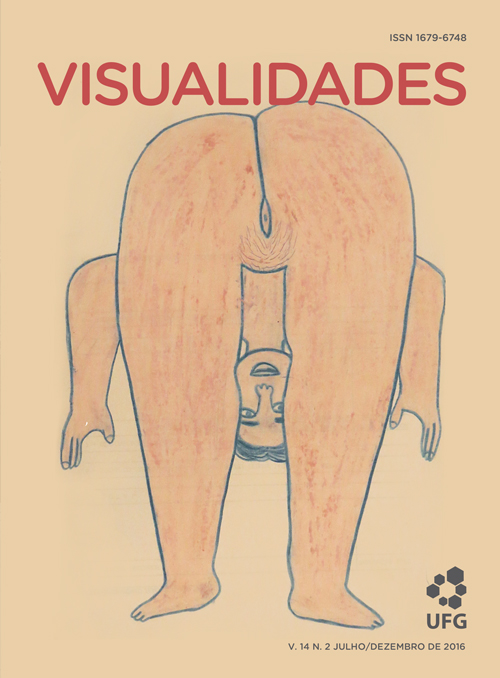Cultural pedagogies and school knowledge: questions to contemporary education
DOI:
https://doi.org/10.5216/vis.v14i2.39670Abstract
This article aims to discuss the ways in which cultural pedagogies are related to school knowledge. In line with different research of the visual culture education field, the text articulates theoretical arguments that approach the pedagogies of pleasure, question, and conflict. It grounds pedagogical proposals that advance from a critical assessment of culture to considerations about the body, experiences, affections, practices of image’s uses and cultural artifacts in order to articulate creative and emancipatory forms of the teaching-learning processes.
Keywords: Cultural pedagogies, body, school knowledge
Downloads
References
AGUIRRE, I. 2009. Imaginando um futuro para a educação artística. In: MARTINS, R.; TOURINHO, I. (Orgs.). Educação da Cultura Visual: narrativas de ensino e pesquisa. Santa Maria, RS: Editora da UFSM. p. 157-186.
________. 2014. Entornos da aprendizagem entre jovens produtores de Cultura Visual: traços e características. In: MARTINS, R.; TOURINHO, I. (Orgs.). Pedagogias culturais. Santa Maria, RS: Editora da UFSM. p. 247-274.
BERTÉ, O. 2014. Corpos se (mo)vendo com imagens e afetos: dança e pedagogias culturais. Goiânia, GO. Tese de Doutorado em Arte e Cultura Visual. Universidade Federal de Goiás, 338f.
DUARTE JÚNIOR, J. 2010. A montanha e o videogame: escritos sobre educação. Campinas: Papirus, 160 p.
FREIRE, P.; FAUNDEZ, A. 2008. Por uma pedagogia da pergunta. 6 ed. Rio de Janeiro: Paz e Terra, 158 p.
GIROUX, H. 1999. A Cultura Popular como uma Pedagogia de Prazer e Significado: Descolonizando o corpo. In: GIROUX, H. Cruzando as fronteiras do discurso: novas políticas em educação. Artmed: Porto Alegre, p. 211-240.
_______. 1995. Praticando Estudos Culturais nas Faculdades de Educação. In: SILVA, T. (org.). Alienígenas na sala de aula. Petrópolis, RJ: Vozes, p. 85-103.
GREINER, C. 2010. Prefácio – A educação amorosa. In: SAITO, C. N. I. Ação e percepção nos processos educacionais do corpo em formação. São Paulo: Hedra, p. 07-08.
GREINER, C.; KATZ, H. 2001. Corpo e processos de comunicação. In: Revista Fronteiras: estudos midiáticos. São Leopoldo: UNISINOS, Vol. 3, n. 2, p. 65-75, dez.
HOOKS, B. 2001. Eros, erotismo e o processo pedagógico. In: LOURO, G. L. O corpo educado: pedagogias da sexualidade. Belo Horizonte: Autêntica, p. 113-123.
KATZ, H. 2005. Um, Dois, Três. A dança é o pensamento do corpo. Belo Horizonte: FID, 273 p.
_______. 2010. O papel do corpo na transformação da política em biopolítica. In: GREINER, C. O corpo em crise: novas pistas e o curto circuito das representações. São Paulo: Annablume, p. 121-132.
KATZ, H.; GREINER, C. 2005. Por uma teoria do corpomídia. In: GREINER, Christine. O corpo: pistas para estudos indisciplinares. São Paulo: Annablume, p. 125-133.
KINCHELOE, J. L.; MCLAREN, P. 2010. Repensando a teoria crítica e a pesquisa qualitativa. In: DENZIN, N.; LINCOLN, Y. (Org.). O planejamento da pesquisa qualitativa: teorias e abordagens. Porto Alegre: Artmed, p. 281-313.
MOREIRA, A. F. B.; CANDAU, V. 2007. Indagações sobre currículo: currículo, conhecimento e cultura. Brasília: Ministério da Educação, Secretaria de Educação Básica, p. 01-48.
PINKER, S. 2004. Tábula rasa – A negação contemporânea da natureza humana. São Paulo: Companhia das Letras, 672 p.
SANTOS, B. S. 1996. Para uma pedagogia do conflito. In: SILVA, L. H.; AZEVEDO, J. C.; SANTOS, E. S. (Orgs.). Novos Mapas Culturais – Novas Perspectivas Educacionais. Porto Alegre: Sulina, p. 13-33.
SILVA, T. T. 2007. Documentos de identidade: uma introdução às teorias do currículo. Belo Horizonte: Autêntica, 154 p.
_______. 2003. O currículo como fetiche: a poética e a política do texto curricular. Belo Horizonte: Autêntica, 117 p.
STEINBERG, S.; KINCHELOE, J. 1997. Cultura infantil e multinacionales: la construcion de la identidade em la infancia. Madrid: Ediciones Morata, 255p.
Downloads
Published
How to Cite
Issue
Section
License

This work is licensed under a Creative Commons Attribution 4.0 International License .
Authors who publish in this journal agree to the following terms:
a. Authors retain the copyright and grant the journal the right of first publication, with the work simultaneously licensed under the Creative Commons Attribution 4.0 License which allows the sharing of work with acknowledgment of authorship and initial publication in this journal.
b. Authors are authorized to take additional contracts separately, for non-exclusive distribution of the version of the work published in this journal (eg publish in institutional repository or as a book chapter), with acknowledgment of authorship and initial publication in this journal.
c. Authors are allowed to publish and distribute their work online (eg in institutional repositories or on their personal page) after the initial publication in this journal, as this can generate productive changes, as well as increase the impact and citation of the published work ( See The Effect of Free Access).
Every effort has been made to identify and credit the rights holders of the published images. If you have rights to any of these images and have not been correctly identified, please contact the Visuals magazine and we will publish the correction in one of the next issues.






